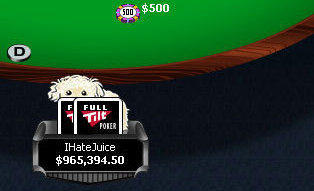






German Professional Eyes Return Of Nosebleed Limit Hold'em Tables On Full Tilt Poker22-Year-Old Was Playing $3,000-$6,000 Before Site Went Down |
|
|
 For a German high-stakes cash game player, having Full Tilt Poker set to return isn’t about recovering his huge sum of money from the site. He really wants to have the action back.
For a German high-stakes cash game player, having Full Tilt Poker set to return isn’t about recovering his huge sum of money from the site. He really wants to have the action back.
The 22-year-old player (who wishes to have his name withheld) was widely known in poker circles by his Full Tilt screen name, Kagome Kagome, after he changed it from IHateJuice. The young pro was a terror at the highest limit hold’em stakes ever offered, on any site, in online poker history.
Phil Ivey, widely considered the best overall player of all-time, once said to the young German in a chat box: “I think we both know you are better than me at [limit hold’em].”
At one time, he was grinding at the absurd $2,000-$4,000 tables, but he wasn’t satisfied with the game. He asked Full Tilt for bigger games, and after Ivey, at the time a sponsored pro, showed interest in the request, the company said OK. In December 2010, after a huge upswing on the site, the German was granted a $3,000-$6,000 table with his name on it. The U.S. government said that Full Tilt was on the road toward insolvency at around this time.
In a Card Player interview a few months before Black Friday, he said that if unable to move up in stakes he would stop playing. “The higher I play, the bigger the thrill I get,” he said. “I can’t imagine any stakes I wouldn’t consider playing.”
Fast forward to August 2012. Thanks to a settlement agreement with the U.S. Department of Justice, PokerStars will repay all non-Americans their entire Full Tilt balances — a total that comes to about $184 million. Americans will have to go through the feds for compensation, and as Forbes reported, how much they receive is still up in the air.
The U.S. government alleges that Full Tilt was acting as a Ponzi scheme after shutting down its business in America after April 15, 2011. Kagome Kagome was still actively engaged on the site, which was still accepting deposits and assuring players that everything was OK. The German wasn’t convinced. He tried to cash out, but the process was painfully slow.
 “I was told that they could only release a certain amount of money every week,” he said. “I think I was able to get $100,000 out in steps before the lights went out. That last month was actually incredible. It felt like being in a theme park at night. I kept playing and won a significant amount of money.”
“I was told that they could only release a certain amount of money every week,” he said. “I think I was able to get $100,000 out in steps before the lights went out. That last month was actually incredible. It felt like being in a theme park at night. I kept playing and won a significant amount of money.”
His bankroll grew, and then it vanished into the abyss of corporate fraud. The German called it an “unpleasant situation,” but he learned to cope through some periods of anger.
“I didn’t want to feel the stress that came along with it, so I decided to give up on the money and think about it as a freeroll situation,” he said. “That allowed me to be very calm and tempered during the past year. Now that the outlook is better than ever, I am contented. I’ll wait for the money to arrive in my account before I celebrate, though.”
“There is a bit of excitement,” he continued, “but it is more about getting Full Tilt back than the money itself. I miss playing the high stakes, and no site was able to replace that after Full Tilt went down. Most of my opponents were either from the U.S. or were Full Tilt pros, so action suddenly became really rare.”
He said that “after being mellow for a few months” he got a job. It ended up being one of the best decisions he has ever made. He began work for a start-up company in Germany and has enjoyed its success. He said he likes doing work “that solves real people’s problems.”
When asked if Kagome Kagome could return to the priciest poker stakes in cyberspace, he said: “If [Full Tilt] offers the same stakes and tables that they did, I’ll try to make my comeback. I don’t need a lot of money in my real life, so the money on Full Tilt is reserved to play as long as I’m passionate for poker.”
PokerStars said it plans to re-open Full Tilt in most markets and that player accounts will be available for withdraw or for continued play. The Isle of Man-based company has permission to re-enter the U.S. under a legal and regulated market. Only Nevada is close to an intrastate industry, but PokerStars has a “credibility issue” there, a state lawmaker told Card Player.
Follow Brian Pempus on Twitter — @brianpempus
